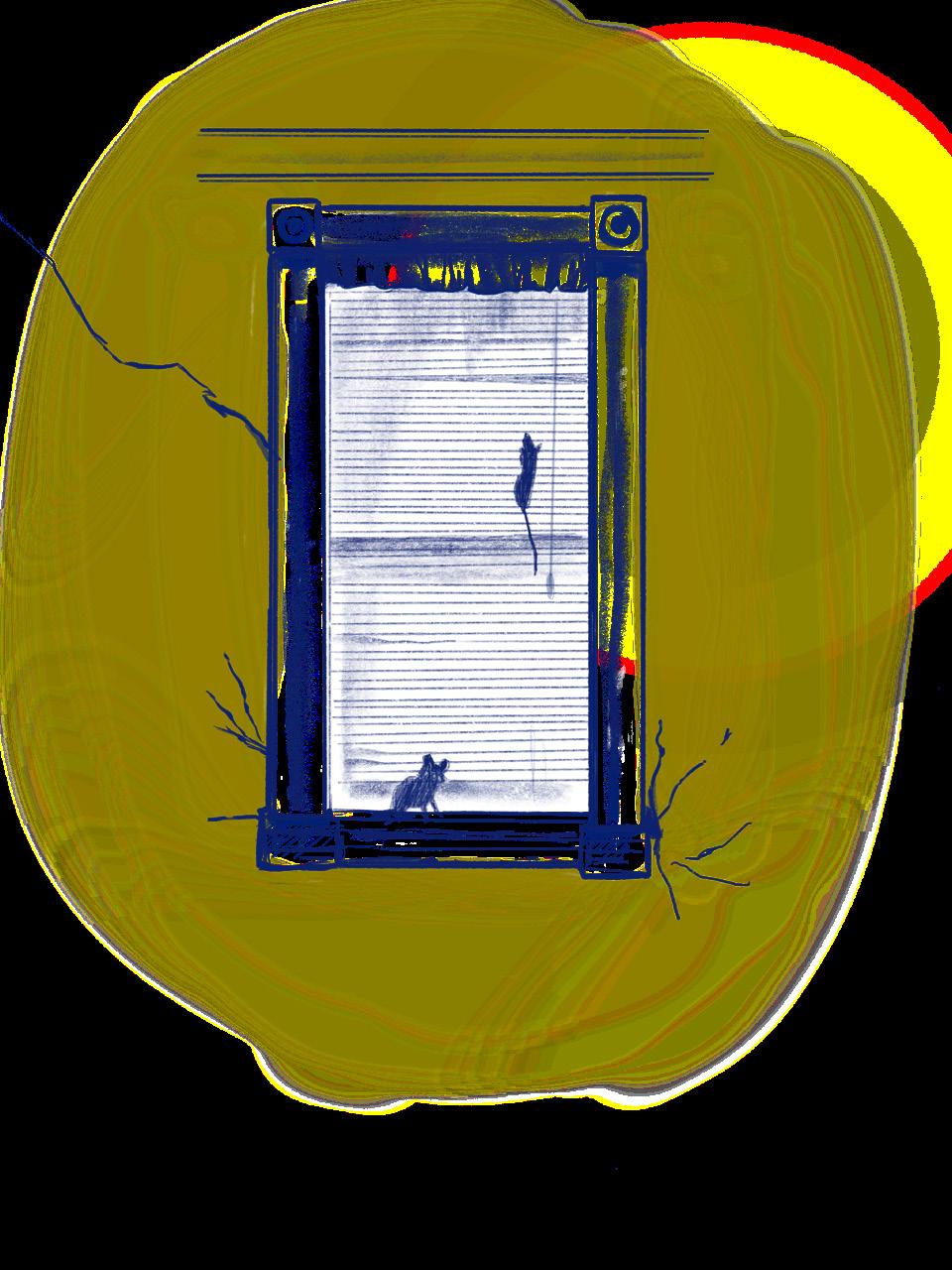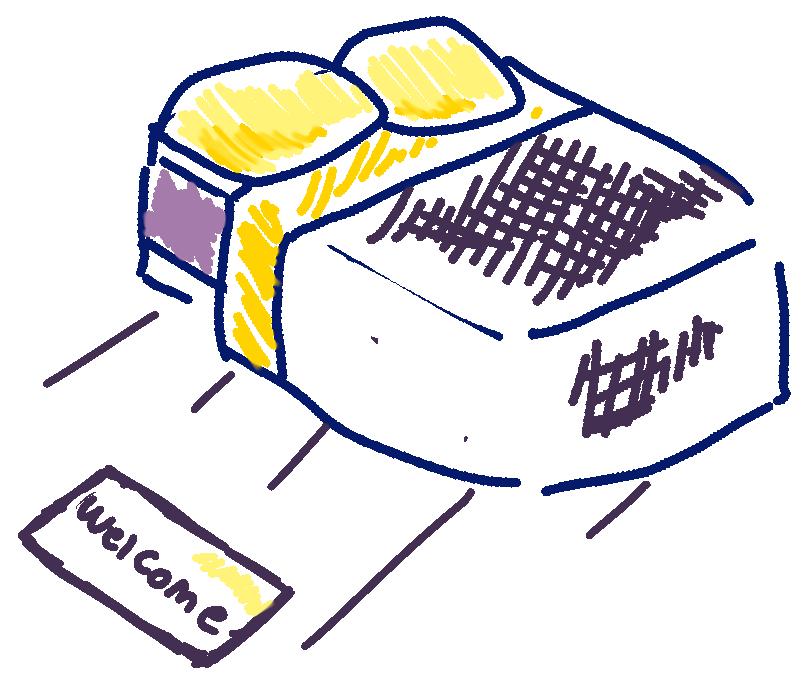Hidden Housing

Stories, Tenancy Rights, and Resources in Kjipuktuk (Halifax)

November 2022 Vol. 1
Hidden Housing Stories might contain legal information. The zine does not contain legal advice, and is not intended to replace talking to a legal professional. Everything depends on individual circumstance and should rely on current information. If you need further help, please see the resources page at the back. This zine is current as of November 24, 2022


Hidden Housing
Stories, Tenancy Rights, and Resources in Kjipuktuk (Halifax)

Cesar ............................................................................................................ 4 VN ................................................................................................................ 12 Mike .............................................................................................................. 8 Gayle ........................................................................................................... 16 List of Tenant Rights ......................................................................... 20 Kathy ........................................................................................................... 6 Juan ............................................................................................................. 14 Floki ............................................................................................................ 10 Campbell .................................................................................................. 18 Resources ................................................................................................ 22 Table of Contents Challenges to Finding a Home Denied Tenancy because of Support Animal I’d Like to Find a Place Outside of this Toxic Environment Disillusioned on Arrival The Cornerstone Conditioned to Normalize 2
Land Acknowledgement
We are publishing this zine from Kjipuktuk, Mi’kma’ki, in the unceded territory of the Mi’kmaq. “Unceded” means that the Indigenous peoples of this land never legally signed away their relationships to the land and water, including but not limited to their rights of fishing, hunting, gathering, and practicing their languages, beliefs, and cultures. Their ways of living a good life are never ceded. This territory is covered by the Peace and Friendship Treaties which Mi’kmaq, Wəlastəkwiyik (Maliseet), and Peskotomuhkati (Passamaquoddy) first signed with the British Crown in 1725. The treaties did not deal with the surrender of lands and resources but in fact, recognized Mi’kmaq and Wəlastəkwiyik titles and established the rules for what was to be an ongoing relationship between nations. We are all Treaty people. Mi’kma’ki includes all of Nova Scotia, Prince Edward Island, part of New Brunswick, the Gaspé region of Quebec, part of Maine, and Newfoundland. Kjipuktuk, the name of the place we’re standing on, consists of kji- “the great”, pukt “a harbor”, and -uk “by, around”. So Kjipuktuk means “by the great harbor”. We encourage you to learn about place names in Indigenous languages and reflect on the relationships embedded in these names.
Thanks/Wela’lioq
We would like to give thanks to the RISE Halifax Project Coordinator, Excel Garay, and the RISE mentors, Calendula Sack, Mimi O’Handley, and Rhea Gupta, for their support throughout this project. We would also like to thank all the community members and non-profit leaders and grassroots organizers who have shared their insights throughout this project through their participation in the community consultation and for their willingness to have their stories and knowledge shared both inside and outside of this zine.
Halifax Rise Cohort 10
Morgan Mitchell
Vinn Elliott
Zonghua Ai Harvey Song Denisse Molina Catherine St-Jean
3
Cesar
Challenges to Finding a Home

We arrived in Halifax in May 2022 as a family of four; two adults, our young daughter, and our dog. Some friends, already in Nova Scotia, warned us it could be hard to find housing but we naively assumed that if we were flexible and looked hard enough we would be ok. However, we had no idea how bad the situation was until we arrived in Halifax.
We immediately came up against many issues, such as: online property listings are not accurate or regularly updated so we started ringing many rental agencies to be told they actually have no availability and joined many waiting lists. Scam listings/questionable landlords; we were contacted by many people online with fake listings. We were offered a rental by a landlord we discovered had been previously convicted for fraud and was still under investigation for other dealings, and were informed we needed to pay a fee ($35) to fill out a rental application form to even be considered for a viewing. There were also unliveable properties; we entered one property to find hundreds of maggots covering the kitchen floor.
The biggest barrier we faced was the fact that we had a dog, and even our young daughter. It was made clear to us via ad responses and at in-person viewings that this was just not desirable and our applications went no further.
After wiping out a large amount of our savings on numerous Air BNBs and motels around Nova Scotia, we were finally lucky and found a basement apartment at a reasonable price. The housing situation in Nova Scotia is grim and is only going to continue to get worse until serious action is taken.
4
Tenant Right

Did you know that: Rental application fees are illegal. A landlord cannot ask you for a rental application fee when you are looking for a place to rent. The landlord is also responsible for keeping the apartment free from pests. If your landlord tries to get rid of the pests but can’t, you can still end the lease (as long as the pests are a major problem).

5
Disillusioned on Arrival

I am 30 years old. I arrived in Canada 3 months ago with the illusion of starting a new life again, just as they paint it in the immigration plans and the government promotes it. So in this way, I want to express my feelings, but also those of several immigrant colleagues who came to Halifax for work reasons.
Getting an apartment was quite an issue. You have to enter a list of referrals for the landlords to look at your application since the online pages that advertise rentals receive at least a thousand messages from applicants every day. The city and the government’s Atlantic Program are attracting high-skilled immigrants to the region, but Halifax as a local government is not making efforts to control the rent increase or have enough options to receive the people who are arriving.
After renting the apartment, for the first two months of being in the apartment, the landlord did not want to invest anything in fixing it; there were broken walls, broken doors, rats inside the apartments, and broken windows. It was disrespectful and abusive to the tenants. After putting a lot of pressure and making them understand that they cannot abuse the legal ignorance of the recently arrived immigrants, they gradually began to make arrangements. Local government supervision is needed so that they do not seek more immigrants. There is clearly a shortage of labour in the region. But those of us who are coming to cover the demand, find ourselves with worse conditions than what we are used to in our own countries. Which in the end makes one have to put up with these situations of abuse or to think about returning to the country of origin.
6
Kathy
Tenant Right

Did you know that: Your landlord must keep your unit in a decent state of repair. Before signing your lease, the condition of the flooring, the walls, the kitchen and bathroom counters, and everything else in the unit should be checked with or without the landlord. A written note of any damage should be made and signed by the landlord. They must comply with all applicable health, safety, and housing laws. If your landlord is refusing to make necessary repairs you can file a complaint with Residential Tenancies, but CANNOT withhold rent from your landlord.

7
I am an international student who has lived in Halifax for 3 years. During this time, I have seen how rent prices have gone up a lot, and as a student, this is a huge concern. I work 20 hours a week and I am paid minimum wage. I use all my income to pay for food, transportation, rent, education, etc. Hence, I am forced to look for cheap rent options. I live with a retired couple who are in their 80s. They are very restrictive and do not allow me to have any guests, or use the common spaces for too long. I am confined to a small room in their attic. One of them has also made derogatory and racist comments that affect my self-esteem. This kind of scenario is not good for my mental health. I would like to find a place outside of this toxic environment, but it is very difficult with the current prices since a bachelor costs 1000 dollars. As time goes by, my mental health deteriorates because of the simple fact of not being able to move to another place. In addition, this directly affects my studies. I hope to be able to move out soon, but it seems almost impossible with the current housing crisis.

8
MikeI’d Like to Find a Place Outside of this Toxic Environment
Tenant Right

Did you know that: A landlord can make rules for a rental property, but the rules need to be reasonable and applied equally to all tenants. Rules cannot remove obligations of either the landlord or tenant under the Residential Tenancies Act or Standard Form of Lease. Also, the Nova Scotia Human Rights Act prohibits landlords from discriminating against people based on a protected characteristic (such as age, race, colour, family status, gender, and more).

9
Floki
Conditioned to Normalize

Before I lived in Halifax, I lived in a rural community where there was little work and few options. I didn’t have parents to rely on, I didn’t have savings to rely on, and I had no help. Looking for work was fruitless. I was looking for anything so I could get the funds together to move out of my situation. Until I found it, while going through an online BDSM chat line. I was offered a job being someone’s private dominator. I was just 18 and it was all very scary at first. You learn to normalize things, our routines became just that and life moved on. I did that for 5 years until I was able to become fully stable by myself. At any time, he could have changed our arrangement and made me do things I was uncomfortable with because when you’re locked into expensive leasing agreements there’s literally nothing you can do but learn to normalize things.
If we had affordable housing programs in Halifax I wouldn’t have been forced to make these decisions just to feel stable.
10
Tenant Right

Did you know that: In Nova Scotia, a tenant has immediate Security of Tenure. This is a legal term that means that your landlord CANNOT end your rental agreement unless they have a legal reason to evict you such as: non-payment of rent, and subletting with no permission, among others.

11
Denied Tenancy because of Support Animal
My situation is quite unique, as I have an emotional support animal. She is a 90lb German Shepard named Bambi. There have been numerous times where a landlord has denied tenancy when they find out I have a large dog, regardless of her being an emotional support animal. Emotional Support animals are not considered the same as Service Animals and thus are not protected through legislation. I do have a letter from a medical professional and all the documents proving the legitimacy of the emotional support classification. However, most landlords will say they do not allow large pets in their buildings. This situation has been challenging as many of the units in my price point, or in the ideal geographic location will not allow me to move in if I bring my dog. I have tried to seek legal counsel or advice from others in a similar situation, but the former is expensive and something I cannot afford.

VN
12
Tenant Right

In Nova Scotia, unlike some other provinces, landlords can make rules in the lease that do not allow pets. If tenants wish to have a pet, they should check the rules for the premises to make sure that pets are allowed. A landlord can’t charge an additional deposit for pets.

13
The Cornerstone

JuanAll my lights and shadows were scattered in my soon-to-be room. It’s a cold place with a miniscule window providing the much-needed sunbeams, a reminiscence of the tropics I abandoned in search of a queer-accepting life.
I had cried enough during the flight, and had to hold it with the immigration officer; it was time to decompress and understand that those 2,837 miles were now behind.
Sobbing, I gently reminded myself how resilient I have to be. Even after a FB-marketplace phishing attempt and a prospective landlord who insinuated I could pay him by easing his mind, I found a one-hour-from-university room for just under 700: so lucky!
Summer again, packing my suitcases. I have found a new roommate, a relationship that is flourishing. Signs of love and care in the middle of a convulsed free market that is trying to eat us. One year after my arrival I learned that the cornerstone of social resistance is love: without my friends and my novio I could not be, and I could not survive the vile free market that is coming after us, after our right to exist.
I exist because of them, of their love, and together we stand.

14
Tenant Right

Did you know that: Landlords cannot charge an application fee in order for a tenant to be considered for a rental unit. Any money taken by a landlord before the lease has been signed or before rent is due is considered a security deposit. The deposit can be up to 1/2 of 1 month’s rent.

Gayle
What are some of the largest barriers you see the community of people you serve facing currently? What could improve them in both the immediate and long term future ?
High rents. That seems to be the main one. Lack of income. Subsidies that don’t actually reflect the rent that they’re paying. It’s based on the average market rent that’s determined by theprovince, so it’s not realistic.
What are some things that you could see improving issues such as high rents in the future?
We need social housing, and also just make housing free. And, again, subsidies based on the actual rent of the unit and the person’s income, and not a number made up by the government.
What do you wish people understood about the limitations you have to work within to help serve the folks you work with as an employee of a nonprofit?
I would say a lack of funding is a big challenge, for example in my housing support worker jobmy salary actually comes from the province of Nova Scotia, but they don’t give me any type of funding for gift cards, tents, sleeping bags, and other needs folks might have, so we have to turnto donations, but it’s also like the state and citizens seem to have this warped idea that it should be non profits solving a housing crisis [and state enforced poverty] caused by the state.
What limitations or rules/mandates would you personally alter within your or other respective organizations to better serve the community?
The expectation to be diplomatic when critiquing the state. People have actually gotten fired for critiquing the province. I know people who have been fired from 3 jobs because the provincesaid “let them go”.

What are some basic harm reduction tips everyone should know? And for folks who don’t know, what is harm reduction?
Everyone should have naloxone or have it easily accessible to them because it isn’t just people who use opiates who are at risk of overdose. Someone with cancer could have forgotten that they took their painkillers and end
16
up taking a double dose and end up going into withdrawal. To me, harm reduction is “what can I do to keep you safe? What can I do to help reduce the spread of illness?” It’s about safety and what that person needs.
Are there any patterns (common themes) in the housing stories you heard or witnessed? In what way do you think we can address those problems?


Alot of it is about income and no support networks, so like family, some folks don’t have good relationships with their families or they were wards of the state so they are taken from their parents for, most times, arbitrary reasons and they were actually harmed more in the foster care system than with their parents who were suffering with a substance use disorder, also many folks get banned; if you upset many property managers to specific resources they will PPA you from the building completely. Stigma as well, especially if you are criminalized. Many people are told they cannot live in certain places because of crimes that were most likely driven by poverty.
People need to be aware of how many working class people are homeless right now. It’s very alarming, the lack of support for people who are getting up and going to work every day. One person I spoke to was incarcerated, got out, was doing really well and sober. Because of transphobia in a room she was living in, she had to leave for her own safety. She’s now working full time while navigating living in a hotel. We’re the only species on the planet who have to pay for housing. Other species are laughing at us.
17
The most obvious one is income and finances. A lot of the folks I support, who are forced to live outside, are restricted to an income assistance allowance of $380 a month, and that is an amount of money that is very disincentivizing when being on a survival lifestyle. Other barriers people face are
being racialized, criminalized, using substances, and having mental health issues. Landlords are looking for that perfect square archetype of 9-5s with good income, but there are a lot of people who are excluded from that particular type.
What are some of the largest barriers you see faced by the community of people you serve? Are there any solutions/ things that can improve the stigma, or issues around income assistance either in the medium or long term future?


The most immediate need for the housing crisis is a huge massive injection of affordable housing that is accessible to people on that amount of income assistance. However, I think that people still face barriers, and without proper rent controls or caps, these rentals will continue to increase. I feel like another solution for that particular issue is for there to be more funding to support housing organizations or folks who are familiar with vulnerable communities because they know the unique needs and barriers people face and can support them.
I think it is the general expectation of a lot of the public, and especially the government, that non-profits will stop the gap, and it is just super unreasonable. I work for a non-profit that is provincially funded, but not funded enough to really be able to do what it is needed in the situation. However, the government thinks they are doing their job by giving us this scrappy amount of money to work with, whereas we need a lot more to be able to really provide people the dignified lives, opportunities, and resources they deserve. The government got the resources and the money to create the housing that is needed right now and to fund us better; however, without being forced to do so, they will not act out of the goodness of their hearts and do what is right.
Campbell
What do you wish people understood about the limitations you have to work within to help serve the folks you work with as an employee of a nonprofit? 18
What limitations or rules/mandates would you personally alter within your or other respective organizations to better serve the community?
One of the most heartbreaking jobs in my workplace is that there are so many vulnerable folks and houseless folks who come to our organization looking for support, particularly housing. We are only able to support 60 people to have a permanent space, but the actual demand and need for it is way greater, so we are constantly turning people away. What we need to actually meet the demand is a lot more money, a lot more space and infrastructure, and policies and legal stuff that shifts the power dynamics away from landlords and developers, and creates a real incentive for public housing and affordable housing on a massive scale.
And for folks who don’t know, what is harm reduction?
It is basically people in positions of privilege, or people who are compassionate, doing everything they can to meet people where they are at, who are super vulnerable to systemic violence, unable to easily access essential resources, and not being judgmental while providing support and resources.
Can you think of any resources/ tips that the community you serve could use?
Not making assumptions about if or why somebody is using substances or why they’re homeless. Just being hyper-compassionate, and asking ourselves what could have led somebody to a position where they are not able to look after themselves because they have not had the proper support or care offered to them at any point in their lives. If there was one thing you could do as an individual to help someone who is struggling, I think just taking away judgement is the best answer. Landlords will just use any little thing as an excuse to give that harshly official-looking eviction letter and make someone feel that they are legally forced to leave their homes, and that is not necessarily the case. I have definitely seen some of the folks I support who are living outside because they were illegally evicted. There are also a lot of people living rurally in NS who are experiencing stigmatization of substance use, being unhoused, or struggling to access resources, and are encouraged to leave the county to come to Halifax only to find that organizations and systems here are totally overloaded and unable to support them. I have also seen other patterns like, people trying to navigate support from organizations finding themselves with a social worker who is uncompassionate, robotic, and not treating them like a human.
Are there any patterns (common themes) in the housing stories you heard or Witnessed?

19
List of Tenant Rights

Before Signing The Lease
Application Process
· The landlord may ask tenants to provide standard information (name and contact information, information about their employment, and references).
· Landlords can conduct credit and background checks on prospective tenants but are not allowed to force tenants to provide their Social Insurance Number.
· The Nova Scotia Human Rights Act prohibits landlords from discriminating against people based on a protected characteristic.
· Landlords cannot charge an application fee.
Inspecting the Premises: Before signing
· A written note of any damage should be made and signed by the landlord. If any damage goes unnoticed, the landlord may assume new tenants are responsible and use the security deposit to repair it.
· If the tenant and the landlord have agreed that repairs or renovations will be done before the tenant moves in, this agreement should be in writing and include a completion date.
· You should avoid paying anything related to your tenancy in cash so that you can have a way of documenting your payments.
Tenants’ Insurance
· Tenants’ Insurance is recommended. If not, tenants could lose everything in the event of theft or damage.
· Your landlord cannot evict you for not having tenant insurance, but they could charge you for the costs of damages to the unit that would have been covered by tenant insurance.
Landlord Rules
· A landlord can make rules for a rental property. Rules need to be reasonable and applied equally to all tenants. Rules cannot remove obligations of either the landlord or tenant under the Residential Tenancies Act or Standard Form of Lease.
· The landlord should give tenants a copy of the rules before they sign the lease.
· If tenants wish to have a pet, they should check the rules for the premises to make sure that pets are allowed. A landlord can’t charge an additional deposit for pets.
Signing The Lease
· Based on the tenant’s finances, a landlord can ask the tenant to have a guarantor (co-signer).
· Landlords must give tenants a signed copy of the lease agreement along with a copy of the Residential Tenancies Act within 10 days of the tenant signing the lease or moving into the rental unit.
· A tenancy continues until either the tenant or the landlord gives a proper Notice to Quit.
20
Security Deposit
· When tenants sign a lease, the landlord can ask for a security deposit. The deposit can be up to 1/2 of 1 month’s rent. The landlord needs to put the security deposit in a trust account.
· The trust account stays with the property and not with the landlord. If the landlord changes, the deposit becomes the responsibility of the new landlord.
· The landlord might want to use the security deposit when tenants move out to cover any unpaid rent or damages. A certain amount of wear and tear on a unit is considered normal, and the deposit cannot be used to pay for repairing this.
After

Signing The Lease
Moving
· Tenants should inspect the premises when they move in. The inspection can be done with or without the landlord.
· Taking pictures of any damage found with a date stamp can also be useful should there be a dispute over damages at the end of the lease.
In Rent
· The method(s) of payment acceptable should be indicated in the lease agreement.
· Tenants are responsible for paying rent on time. Landlords can charge 1% of the monthly rent per month for any late rent.
· Once the rent is 15 days late, the landlord can give tenants an eviction notice. If rent is paid before the deadline, it will be set aside and the lease will continue as it did before. Otherwise, tenants have to move out by the date on the notice.
· Starting 1 February 2022 – A rent cap is in place until 31 December 2023. For existing tenants, rent can only increase up to 2% above the amount to pay in the preceding 12 months. Landlords can only increase the rent once in a 12-month period, on the anniversary date of the tenancy (lease). Landlords need to give tenants notice of a rent increase in writing.
· Landlords aren’t allowed to turn off the heat to a unit, even if tenants owe rent or there is a dispute.
· Whoever is responsible for heating the unit needs to keep it warm enough to prevent damage. The temperature on the premises should be 20C° to 22C°.
Rent Increase Heat & Utilities Lock and Landlord Access
· Locks can only be changed if both tenants and the landlord agree. The landlord is allowed to have a key to the unit.
· The landlord CANNOT enter your unit without proper notice unless they have your permission or there is an emergency, a written notice has been given, or a Notice to Quit has been given.
21
· To show the unit to prospective tenants: after Notice to Quit has been given by current tenants, or by the landlord and tenants haven’t challenged it.
· The landlord can only enter the unit during normal daylight hours, from 9am to 9pm.
Ending Tenancy

· All leases, except fixed-term leases, automatically renew for the same period unless a proper Notice to Quit is given.
· As a tenant, you can end your lease at the end of a rental term, but you must give your landlord a written Notice to Quit. The time involved depends on the type of lease, who is submitting the notice, and the reason for the notice.
Maintenance
· Landlords need to keep the rental property fit for living and comply with any law respecting standards of health, safety, or housing.
· Tenants are responsible for any repairs that need to be made due to neglect or damage on their part or by any guests they allow into the premises.
· Bed bugs: you can be held responsible if you brought the bed bugs with you to the apartment. The landlord is responsible for treating the unit for bed bugs. The tenant (you) is responsible for damage caused by bed bugs if you brought the bed bugs into the unit.
· If you are living in the Halifax Regional Municipality (HRM), you can call HRM customer service at 311. The inspector will give your landlord an order to do the repairs, and if your landlord does not do them within thirty days, HRM will do the repairs and charge your landlord.
Problem Resolution
· In case of a dispute, both parties should try to work together to find a solution.
· Reviewing the lease and the Residential Tenancies Act may provide the answer to the dispute.
· If parties cannot resolve the dispute on their own, the Residential Tenancies Program is available to help.
Rights/Housing Support Organizations Nova
ACORN Elizabeth Fry Society Mi’kmaq Native Friendship Center- Housing Programs 22
Resources acorncanada.org/locations/nova-scotia-acorn efrymns.ca mymnfc.com/programs-home Housing
Scotia

beta.novascotia.ca/residential-tenancy-forms feednovascotia.ca/find-food
Food Bank/Community Fridge Harm Reduction Housing Rights Resources Halifax Community Fridge Naloxone kits Dal Legal Aid Tenant Rights Guide Harbour City Homes Residential Tenancy Policies Dartmouth Community Fridge Dalhousie Legal Aid Co-operative Housing Federation of Canada Residential Tenancy Forms Feed Nova Scotia Nova Scotia Legal Aid Adsum for Women & Children Residential Tenancies - Access Nova Scotia This Should Be Housing Affordable Housing Association of Nova Scotia 23
outofthecold-hfx.ca Out of the Cold Halifax instagram.com/communityfridgehfx nsnaloxone.com/where-to-get-one.html legalinfo.org/housing-owning-renting-neighbours/ dalhousie-legal-aid-tenant-rights-guide harbourcityhomes.org beta.novascotia.ca/documents/residential-tenancy-policies instagram.com/communityfridgedartmouth dal.ca/faculty/law/dlas.html chfcanada.coop/about-co-op-housing/find-a-co-op
nslegalaid.ca/legal-information/residential-tenancy adsumforwomen.org beta.novascotia.ca/documents/residential-tenancy-guides thisshouldbehousing.com ahans.ca
POSSE - NS organization
posseproject.ca

Mainline
mainlineneedleexchange.ca acns.ns.ca/progs-services/peer-n-peer.html
Peer N Peer Project
Some Good News
cbc.ca/amp/1.6639119 cbc.ca/news/canada/nova-scotia/victory-tenants-rightshalifax-woman-renoviction-decision-1.6580277 cbc.ca/news/canada/nova-scotia/travelodge-dartmouthaffordable-housing-1.6329674
Other Compiled Lists
IWK’s Housing & Food Hub Resources
Vicky Levack, N.S disability rights advocate is able to move out of nursing home Stacy Gomez wins legal battle against landlord who attempted to renovict her The Overlook, Dartmouth travelodge to be turned into support housing iwk.nshealth.ca/housing-and-food-hub-resources
Dalhousie Student Union’s Shelters and Housing by Regions list
dsu.ca/shelters-housing
References
Service Nova Scotia and Internal Services. (2019, June). Residential Tenancies Guides - Renting. Province of Nova Scotia. Retrieved from https://beta.novascotia.ca/documents/residential-tenancies-rentingguide-tenants-and-landlords
Dalhousie Legal Aid Service. (2019, June 11). Tenant Rights Guide - A General Guide to Rental Housing in Nova Scotia. Retrieved from https://www. legalinfo.org/housing-owning-renting-neighbours/dalhousie-legal-aidtenant-rights-guide
Service Nova Scotia and Internal Services. (2022, May 19). Residential Tenancies Program: Legislative changes. novascotia.ca. Retrieved from https://beta.novascotia.ca/residential-tenancies-program-legislativechanges
24


About Hidden Housing
Throughout discussions within our cohort, we decided that housing precarity was a topic that was important to us and incredibly relevant in Halifax today. The importance of giving people space to share their stories, making resources accessible, and challenging the stigma around housing precarity was emphasized in conversations with community members, organizers, and not-for-profit leaders. It is for this reason that we decided to create this zine. In it, you will find stories and advice from community members and not-forprofit workers, as well as a compiled list of tenancy rights and resources. For confidentiality reasons, some names in the stories have been changed.
About RISE





We are ambassadors under the tenth Halifax Cohort of the Apathy is Boring’s RISE program. The RISE program is an initiative under the Canada Service Corps that targets youth (18-30) and empowers them to co-create community projects to contribute to strengthening our civic and democratic fabric by engaging topics that interest them and benefit their community.
Thank you to RISE, Canada Service Corps and Apathy is Boring for bringing us together and making this project possible.























